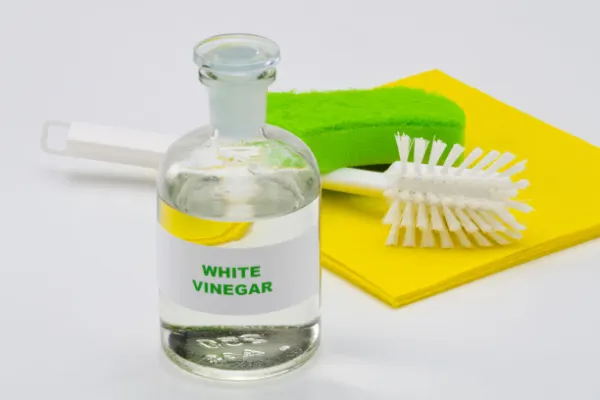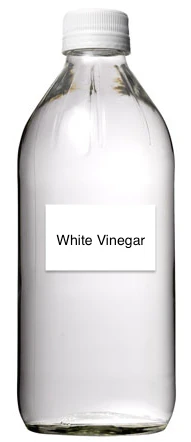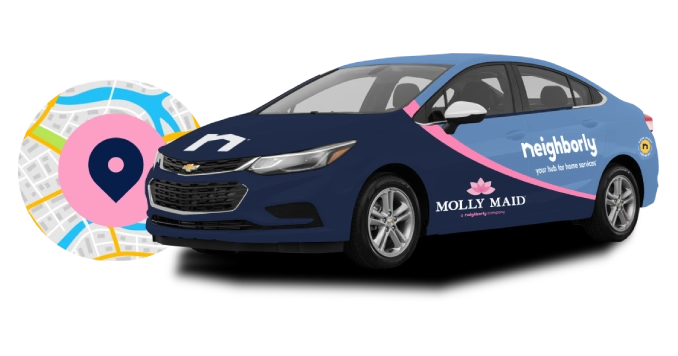
Distilled white vinegar makes an excellent multi-purpose cleaner. It doesn’t contain harsh chemicals, and vinegar costs much less—especially when diluted—than commercial products. You should only use it on certain surfaces, though, and only with water for many uses. Learn more about this versatile cleaner, and then add it to your cabinet of household supplies.
Do Not Use Vinegar On

Vinegar has a pH value of 2.4, making it highly acidic. Even diluted, it can etch natural stone. Makers of stone countertops and floor tiles strongly advise against using it on their products. Vinegar can deteriorate grout as well.
Also take care if using vinegar on sealed hardwood floors, as it can damage the finish. Test in an inconspicuous spot before mopping an entire floor.
Never use vinegar on an eggy mess. The acidity will cause it to coagulate and become even more difficult to clean.
Diluting Vinegar
A solution of equal parts vinegar and water works well as a multi-purpose cleaner, but Heinz actually recommends using it at full strength for certain purposes, such as to remove:
- Streaks from windows
- Stains from pots and pans—soak for 30 minutes
- Soapy film from glassware—add 1 cup to the bottom of your dishwasher
- Stains from toilet bowls—add 1 cup and let stand for five minutes
How to Use Vinegar
Application methods also vary by surface. Use a spray bottle for non-stone countertops and other small areas in the kitchen and bathroom. A bucket helps you more easily tackle larger surfaces such as floors; use 1 cup of vinegar per 1 gallon of warm water. Both containers are likely already in your cleaning supplies cabinet. If not, add them as well as the other items we recommend having on hand in our Ultimate Cleaning Products List for Every Room in Your House.
Where to Use Vinegar
Here are some other ways to use this versatile cleaning product in your home:
Bathroom
- Remove hard water deposits and stains from showerheads and faucets by filling a zip-close bag with undiluted vinegar and attaching with a rubber band or twist tie so that the fixture sits in the vinegar; let soak overnight.
- Remove hard water deposits and stains from toilets by soaking paper towels in undiluted vinegar and placing in bowl; let sit overnight.
- Your multi-purpose vinegar cleaning solution also will remove soap deposits in the shower/bathtub; again, do not use on natural stone tiles.
Kitchen
- Clean and deodorize your microwave by placing a bowl with ½ cup vinegar and 1 cup water inside and bringing to a boil; wipe down with a clean sponge.
- Clean and deodorize your disposal by pouring 1 cup undiluted vinegar down the drain; wait an hour and run hot water through.
- Clean wood cutting boards by spraying with undiluted vinegar; wipe with a clean sponge.
- Dissolve hard water deposits in your automatic coffeemaker by filling the reservoir with undiluted vinegar and running a brew cycle.
Laundry Room
- Clean your washing machine by running a hot water cycle with 1 cup of undiluted vinegar.
- Soften your clothes by adding ½ cup of undiluted vinegar to the rinse cycle; it will also help lessen the amount of lint produced.
Other Uses for Vinegar Around the House
Did you know that vinegar deters ants? It does, so spray it undiluted at entry points in your home. Vinegar also removes ant trails and helps keep them from finding their way back.
Undiluted vinegar kills dandelions and keeps them from growing again. Simply spray the flower and near the ground so it soaks into the roots.
The smell of vinegar also helps train cats not to climb on certain surfaces. It also can work as a scratching deterrent, but be sure to test any fabric before application.
For your home cleaning needs, contact the professionals at Molly Maid. Each maid services team comprises insured, licensed and uniformed housekeepers who are regularly quality checked. Click here to request service in your area.
